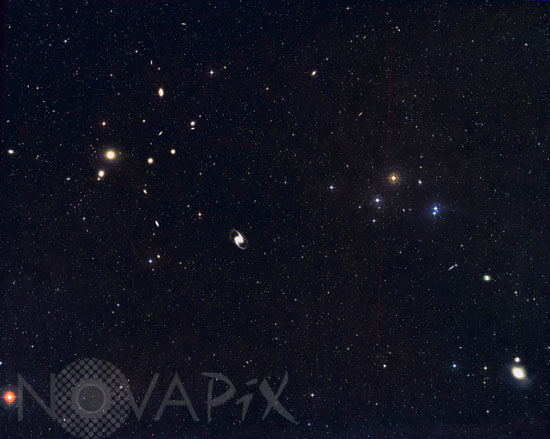Photo Agency - Astronomy - Space - Nature

The cluster of galaxies in Fornax
author: Anglo-Australian Observatory/David Malin Images/Novapix
reference: a-amg02-00001
Image Size 300 DPI: 56 * 45 cm
Galaxies can be separated by their appearance into two broad groups, spirals and ellipticals. An example of a spiral galaxy, NGC 1365, is seen in center of this picture. In contrast, most of the galaxies in this cluster are ellipticals, which contain little or no gas or evidence of star formation; indeed they are composed millions of rather old, yellowish stars. Unlike many of the stars in spiral systems, those in ellipticals have orbits which are not confined to a narrow plane, so the galaxy can have a shape anywhere between a perfect sphere and an American football. This kind of galaxy is the most common type in the photograph as it is in all of the nearby Universe. The picture also illustrates another distinctive property of ellipticals, their gregarious nature - they congregate in clusters, like this group of galaxies in Fornax, 55 million light years distant. This image also shows us another, less common kind of galaxy. In the lower right corner is NGC 1316-17. This is interacting pair of galaxies is one of the strongest nearby radio galaxies, known as Fornax A. Finally, in the opposite corner is a bright yellow (K5) 4.5 magnitude star in the adjoining constellation of Eridanus.
Contact : Stéphane Aubin +33-(0)9-51-26-53-76
© Novapix - All rights reserved


